Management Accounting Report: Budgeting and Decision Making for Fourex
VerifiedAdded on 2023/01/09
|9
|2205
|34
Report
AI Summary
This report delves into the crucial role of management accounting, particularly the use of budgeting, in effective decision-making processes within organizations. It begins by defining management accounting and the concept of budgeting, highlighting its significance in financial planning and control. The report then examines the importance of budgeting for organizations like Fourex, which operates in the finance industry, emphasizing how budgeting aids in predicting, monitoring, and analyzing the market environment. The core of the report explores the role of budgeting in various decision-making scenarios, including project management and operational planning. It differentiates between flexible and static budgeting approaches, analyzing their respective advantages and disadvantages, and concludes by recommending the most appropriate budgeting style for Fourex. Finally, the report highlights the merits and demerits of participative budgeting.
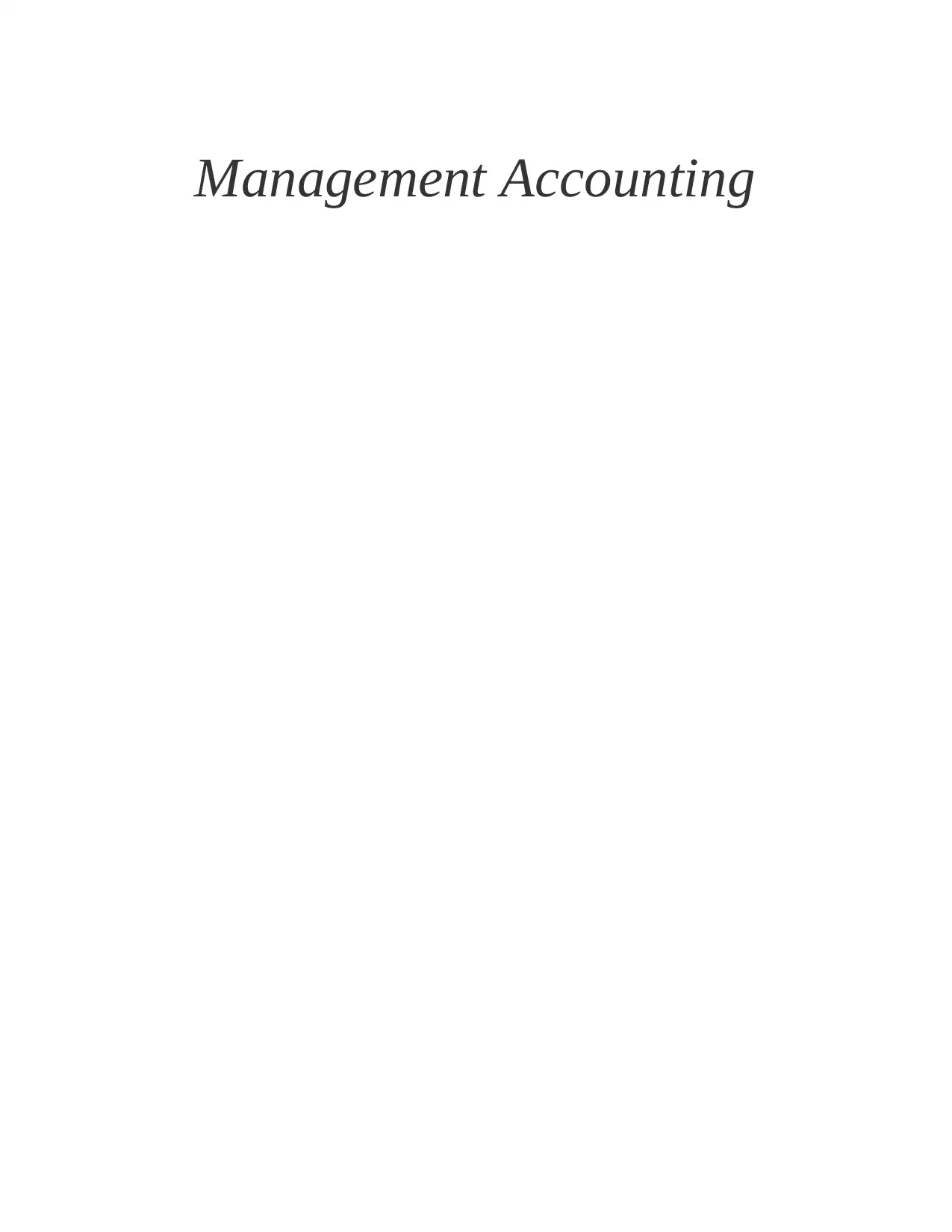
Management Accounting
Paraphrase This Document
Need a fresh take? Get an instant paraphrase of this document with our AI Paraphraser
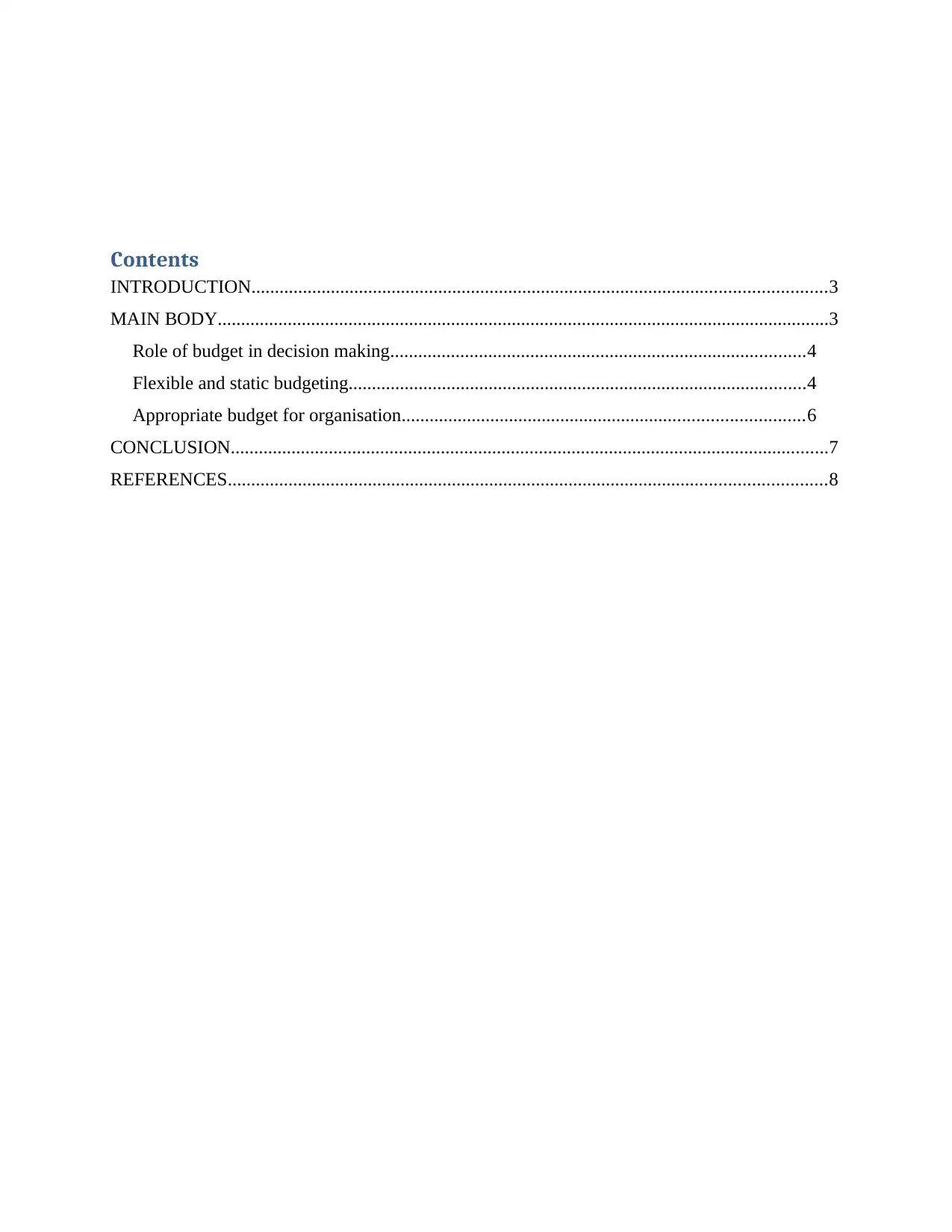
Contents
INTRODUCTION...........................................................................................................................3
MAIN BODY...................................................................................................................................3
Role of budget in decision making.........................................................................................4
Flexible and static budgeting..................................................................................................4
Appropriate budget for organisation......................................................................................6
CONCLUSION................................................................................................................................7
REFERENCES................................................................................................................................8
INTRODUCTION...........................................................................................................................3
MAIN BODY...................................................................................................................................3
Role of budget in decision making.........................................................................................4
Flexible and static budgeting..................................................................................................4
Appropriate budget for organisation......................................................................................6
CONCLUSION................................................................................................................................7
REFERENCES................................................................................................................................8
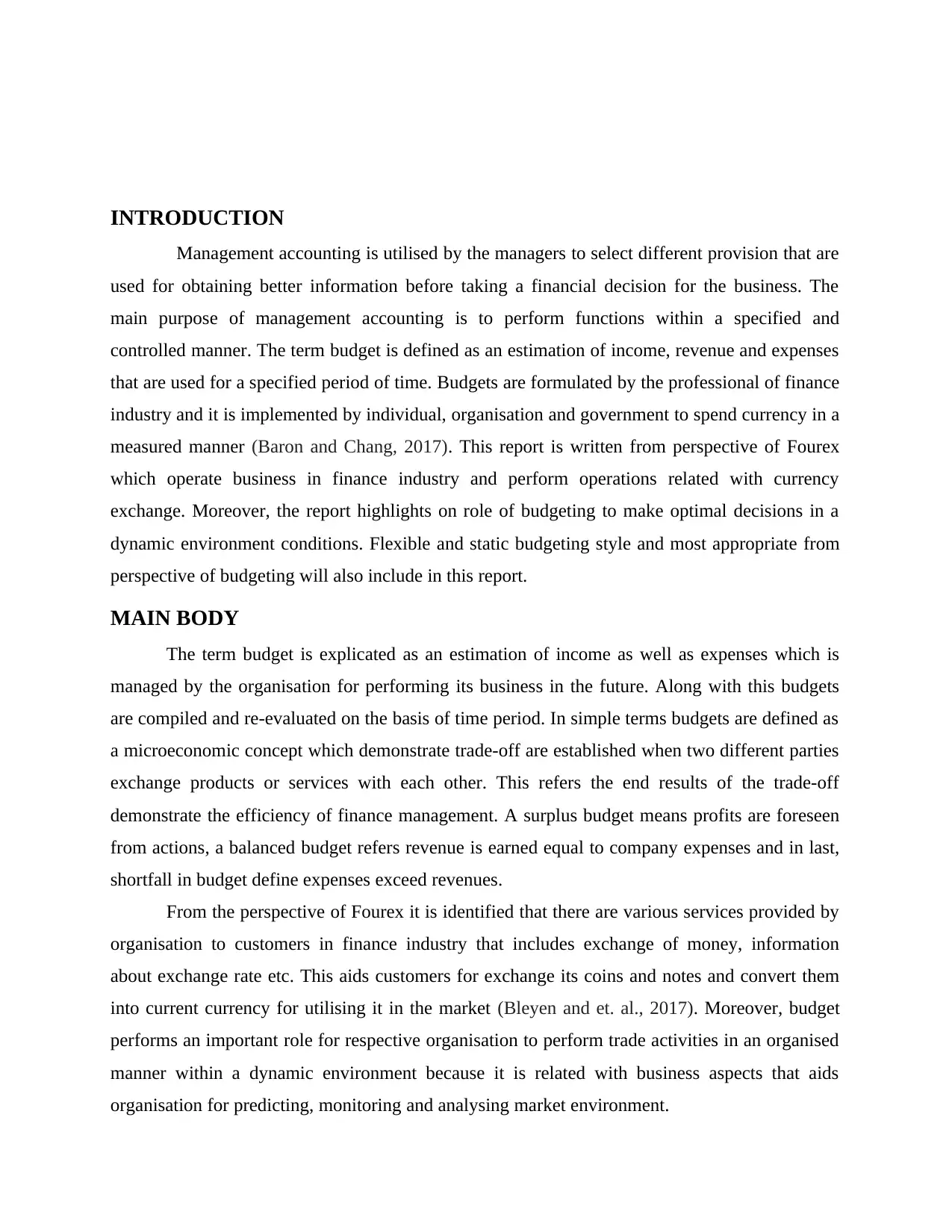
INTRODUCTION
Management accounting is utilised by the managers to select different provision that are
used for obtaining better information before taking a financial decision for the business. The
main purpose of management accounting is to perform functions within a specified and
controlled manner. The term budget is defined as an estimation of income, revenue and expenses
that are used for a specified period of time. Budgets are formulated by the professional of finance
industry and it is implemented by individual, organisation and government to spend currency in a
measured manner (Baron and Chang, 2017). This report is written from perspective of Fourex
which operate business in finance industry and perform operations related with currency
exchange. Moreover, the report highlights on role of budgeting to make optimal decisions in a
dynamic environment conditions. Flexible and static budgeting style and most appropriate from
perspective of budgeting will also include in this report.
MAIN BODY
The term budget is explicated as an estimation of income as well as expenses which is
managed by the organisation for performing its business in the future. Along with this budgets
are compiled and re-evaluated on the basis of time period. In simple terms budgets are defined as
a microeconomic concept which demonstrate trade-off are established when two different parties
exchange products or services with each other. This refers the end results of the trade-off
demonstrate the efficiency of finance management. A surplus budget means profits are foreseen
from actions, a balanced budget refers revenue is earned equal to company expenses and in last,
shortfall in budget define expenses exceed revenues.
From the perspective of Fourex it is identified that there are various services provided by
organisation to customers in finance industry that includes exchange of money, information
about exchange rate etc. This aids customers for exchange its coins and notes and convert them
into current currency for utilising it in the market (Bleyen and et. al., 2017). Moreover, budget
performs an important role for respective organisation to perform trade activities in an organised
manner within a dynamic environment because it is related with business aspects that aids
organisation for predicting, monitoring and analysing market environment.
Management accounting is utilised by the managers to select different provision that are
used for obtaining better information before taking a financial decision for the business. The
main purpose of management accounting is to perform functions within a specified and
controlled manner. The term budget is defined as an estimation of income, revenue and expenses
that are used for a specified period of time. Budgets are formulated by the professional of finance
industry and it is implemented by individual, organisation and government to spend currency in a
measured manner (Baron and Chang, 2017). This report is written from perspective of Fourex
which operate business in finance industry and perform operations related with currency
exchange. Moreover, the report highlights on role of budgeting to make optimal decisions in a
dynamic environment conditions. Flexible and static budgeting style and most appropriate from
perspective of budgeting will also include in this report.
MAIN BODY
The term budget is explicated as an estimation of income as well as expenses which is
managed by the organisation for performing its business in the future. Along with this budgets
are compiled and re-evaluated on the basis of time period. In simple terms budgets are defined as
a microeconomic concept which demonstrate trade-off are established when two different parties
exchange products or services with each other. This refers the end results of the trade-off
demonstrate the efficiency of finance management. A surplus budget means profits are foreseen
from actions, a balanced budget refers revenue is earned equal to company expenses and in last,
shortfall in budget define expenses exceed revenues.
From the perspective of Fourex it is identified that there are various services provided by
organisation to customers in finance industry that includes exchange of money, information
about exchange rate etc. This aids customers for exchange its coins and notes and convert them
into current currency for utilising it in the market (Bleyen and et. al., 2017). Moreover, budget
performs an important role for respective organisation to perform trade activities in an organised
manner within a dynamic environment because it is related with business aspects that aids
organisation for predicting, monitoring and analysing market environment.
⊘ This is a preview!⊘
Do you want full access?
Subscribe today to unlock all pages.

Trusted by 1+ million students worldwide
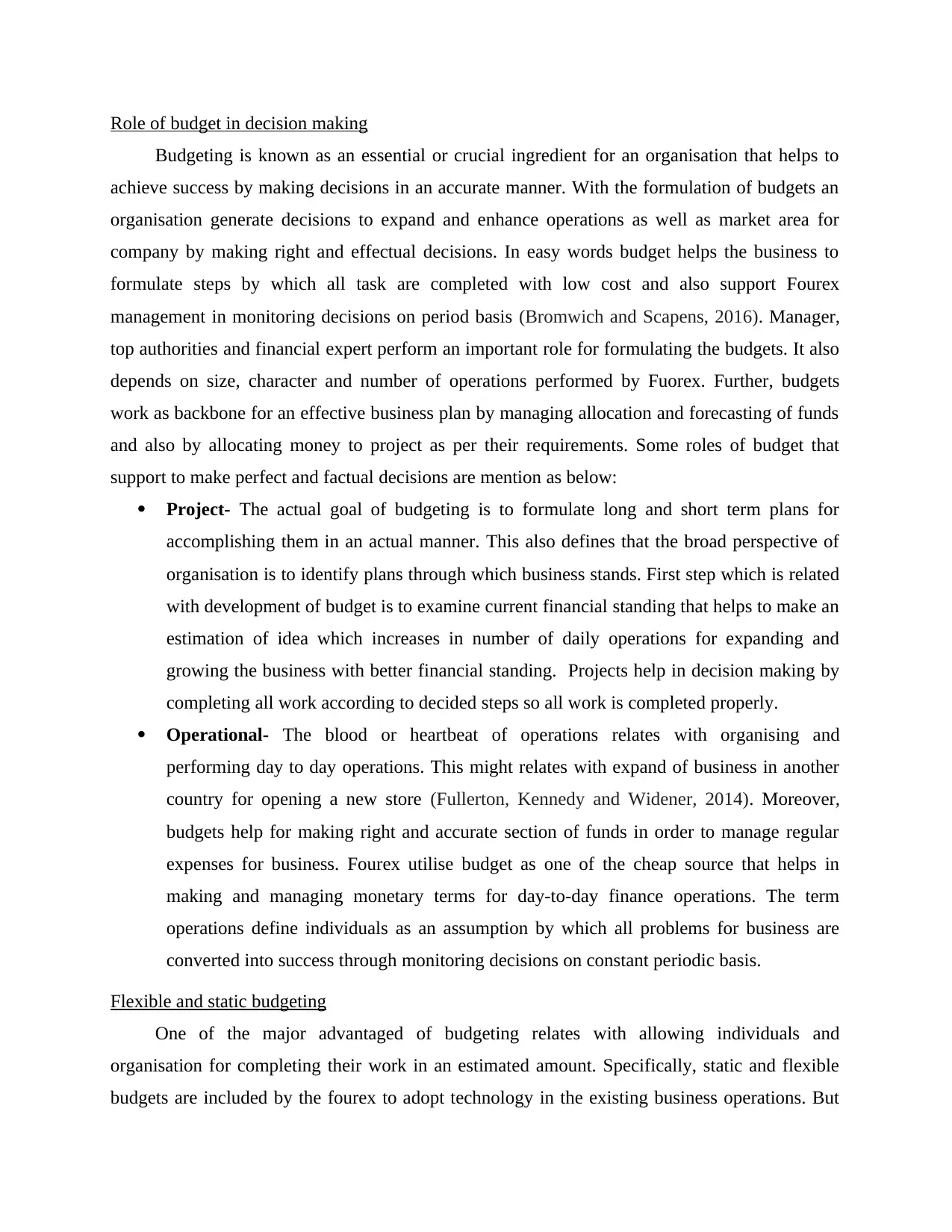
Role of budget in decision making
Budgeting is known as an essential or crucial ingredient for an organisation that helps to
achieve success by making decisions in an accurate manner. With the formulation of budgets an
organisation generate decisions to expand and enhance operations as well as market area for
company by making right and effectual decisions. In easy words budget helps the business to
formulate steps by which all task are completed with low cost and also support Fourex
management in monitoring decisions on period basis (Bromwich and Scapens, 2016). Manager,
top authorities and financial expert perform an important role for formulating the budgets. It also
depends on size, character and number of operations performed by Fuorex. Further, budgets
work as backbone for an effective business plan by managing allocation and forecasting of funds
and also by allocating money to project as per their requirements. Some roles of budget that
support to make perfect and factual decisions are mention as below:
Project- The actual goal of budgeting is to formulate long and short term plans for
accomplishing them in an actual manner. This also defines that the broad perspective of
organisation is to identify plans through which business stands. First step which is related
with development of budget is to examine current financial standing that helps to make an
estimation of idea which increases in number of daily operations for expanding and
growing the business with better financial standing. Projects help in decision making by
completing all work according to decided steps so all work is completed properly.
Operational- The blood or heartbeat of operations relates with organising and
performing day to day operations. This might relates with expand of business in another
country for opening a new store (Fullerton, Kennedy and Widener, 2014). Moreover,
budgets help for making right and accurate section of funds in order to manage regular
expenses for business. Fourex utilise budget as one of the cheap source that helps in
making and managing monetary terms for day-to-day finance operations. The term
operations define individuals as an assumption by which all problems for business are
converted into success through monitoring decisions on constant periodic basis.
Flexible and static budgeting
One of the major advantaged of budgeting relates with allowing individuals and
organisation for completing their work in an estimated amount. Specifically, static and flexible
budgets are included by the fourex to adopt technology in the existing business operations. But
Budgeting is known as an essential or crucial ingredient for an organisation that helps to
achieve success by making decisions in an accurate manner. With the formulation of budgets an
organisation generate decisions to expand and enhance operations as well as market area for
company by making right and effectual decisions. In easy words budget helps the business to
formulate steps by which all task are completed with low cost and also support Fourex
management in monitoring decisions on period basis (Bromwich and Scapens, 2016). Manager,
top authorities and financial expert perform an important role for formulating the budgets. It also
depends on size, character and number of operations performed by Fuorex. Further, budgets
work as backbone for an effective business plan by managing allocation and forecasting of funds
and also by allocating money to project as per their requirements. Some roles of budget that
support to make perfect and factual decisions are mention as below:
Project- The actual goal of budgeting is to formulate long and short term plans for
accomplishing them in an actual manner. This also defines that the broad perspective of
organisation is to identify plans through which business stands. First step which is related
with development of budget is to examine current financial standing that helps to make an
estimation of idea which increases in number of daily operations for expanding and
growing the business with better financial standing. Projects help in decision making by
completing all work according to decided steps so all work is completed properly.
Operational- The blood or heartbeat of operations relates with organising and
performing day to day operations. This might relates with expand of business in another
country for opening a new store (Fullerton, Kennedy and Widener, 2014). Moreover,
budgets help for making right and accurate section of funds in order to manage regular
expenses for business. Fourex utilise budget as one of the cheap source that helps in
making and managing monetary terms for day-to-day finance operations. The term
operations define individuals as an assumption by which all problems for business are
converted into success through monitoring decisions on constant periodic basis.
Flexible and static budgeting
One of the major advantaged of budgeting relates with allowing individuals and
organisation for completing their work in an estimated amount. Specifically, static and flexible
budgets are included by the fourex to adopt technology in the existing business operations. But
Paraphrase This Document
Need a fresh take? Get an instant paraphrase of this document with our AI Paraphraser
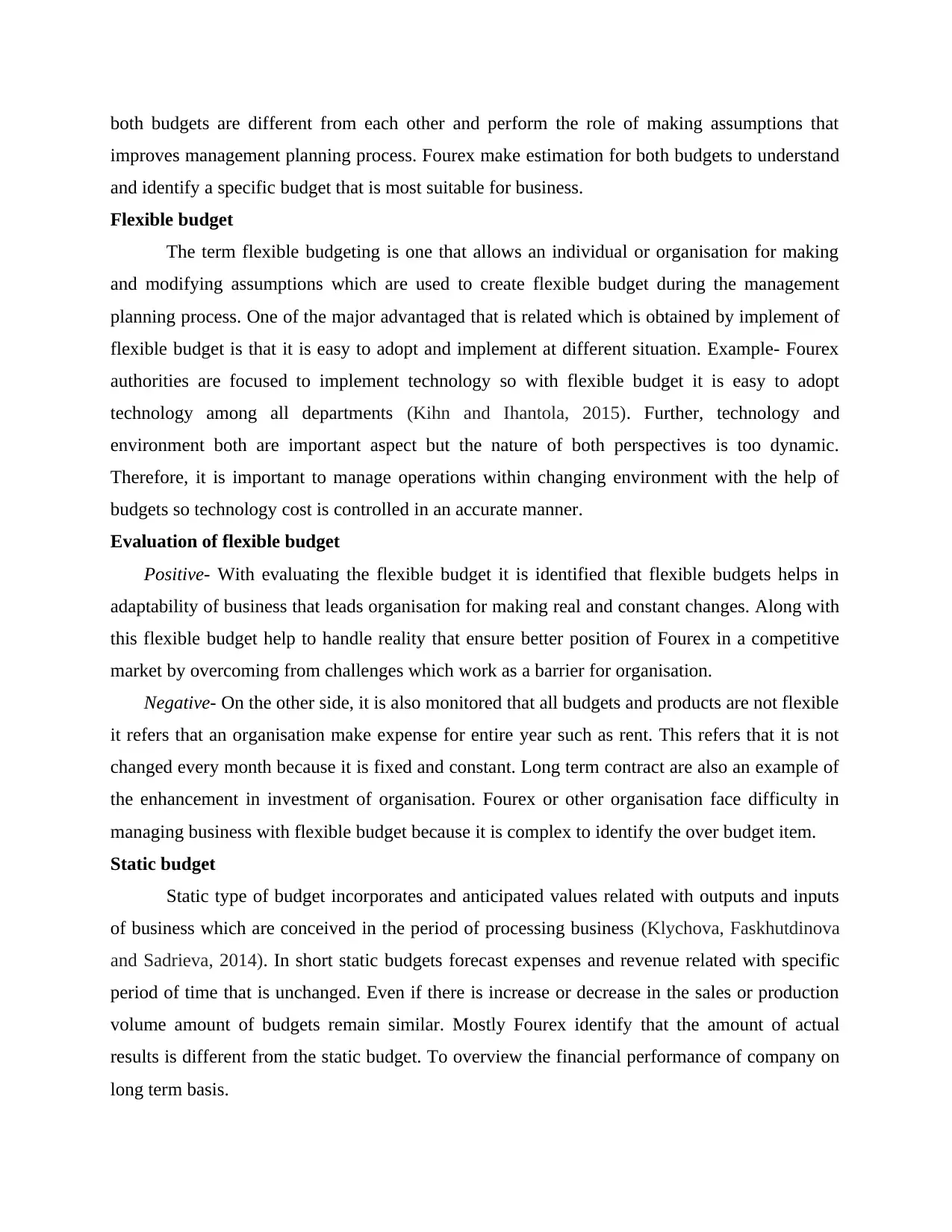
both budgets are different from each other and perform the role of making assumptions that
improves management planning process. Fourex make estimation for both budgets to understand
and identify a specific budget that is most suitable for business.
Flexible budget
The term flexible budgeting is one that allows an individual or organisation for making
and modifying assumptions which are used to create flexible budget during the management
planning process. One of the major advantaged that is related which is obtained by implement of
flexible budget is that it is easy to adopt and implement at different situation. Example- Fourex
authorities are focused to implement technology so with flexible budget it is easy to adopt
technology among all departments (Kihn and Ihantola, 2015). Further, technology and
environment both are important aspect but the nature of both perspectives is too dynamic.
Therefore, it is important to manage operations within changing environment with the help of
budgets so technology cost is controlled in an accurate manner.
Evaluation of flexible budget
Positive- With evaluating the flexible budget it is identified that flexible budgets helps in
adaptability of business that leads organisation for making real and constant changes. Along with
this flexible budget help to handle reality that ensure better position of Fourex in a competitive
market by overcoming from challenges which work as a barrier for organisation.
Negative- On the other side, it is also monitored that all budgets and products are not flexible
it refers that an organisation make expense for entire year such as rent. This refers that it is not
changed every month because it is fixed and constant. Long term contract are also an example of
the enhancement in investment of organisation. Fourex or other organisation face difficulty in
managing business with flexible budget because it is complex to identify the over budget item.
Static budget
Static type of budget incorporates and anticipated values related with outputs and inputs
of business which are conceived in the period of processing business (Klychova, Faskhutdinova
and Sadrieva, 2014). In short static budgets forecast expenses and revenue related with specific
period of time that is unchanged. Even if there is increase or decrease in the sales or production
volume amount of budgets remain similar. Mostly Fourex identify that the amount of actual
results is different from the static budget. To overview the financial performance of company on
long term basis.
improves management planning process. Fourex make estimation for both budgets to understand
and identify a specific budget that is most suitable for business.
Flexible budget
The term flexible budgeting is one that allows an individual or organisation for making
and modifying assumptions which are used to create flexible budget during the management
planning process. One of the major advantaged that is related which is obtained by implement of
flexible budget is that it is easy to adopt and implement at different situation. Example- Fourex
authorities are focused to implement technology so with flexible budget it is easy to adopt
technology among all departments (Kihn and Ihantola, 2015). Further, technology and
environment both are important aspect but the nature of both perspectives is too dynamic.
Therefore, it is important to manage operations within changing environment with the help of
budgets so technology cost is controlled in an accurate manner.
Evaluation of flexible budget
Positive- With evaluating the flexible budget it is identified that flexible budgets helps in
adaptability of business that leads organisation for making real and constant changes. Along with
this flexible budget help to handle reality that ensure better position of Fourex in a competitive
market by overcoming from challenges which work as a barrier for organisation.
Negative- On the other side, it is also monitored that all budgets and products are not flexible
it refers that an organisation make expense for entire year such as rent. This refers that it is not
changed every month because it is fixed and constant. Long term contract are also an example of
the enhancement in investment of organisation. Fourex or other organisation face difficulty in
managing business with flexible budget because it is complex to identify the over budget item.
Static budget
Static type of budget incorporates and anticipated values related with outputs and inputs
of business which are conceived in the period of processing business (Klychova, Faskhutdinova
and Sadrieva, 2014). In short static budgets forecast expenses and revenue related with specific
period of time that is unchanged. Even if there is increase or decrease in the sales or production
volume amount of budgets remain similar. Mostly Fourex identify that the amount of actual
results is different from the static budget. To overview the financial performance of company on
long term basis.
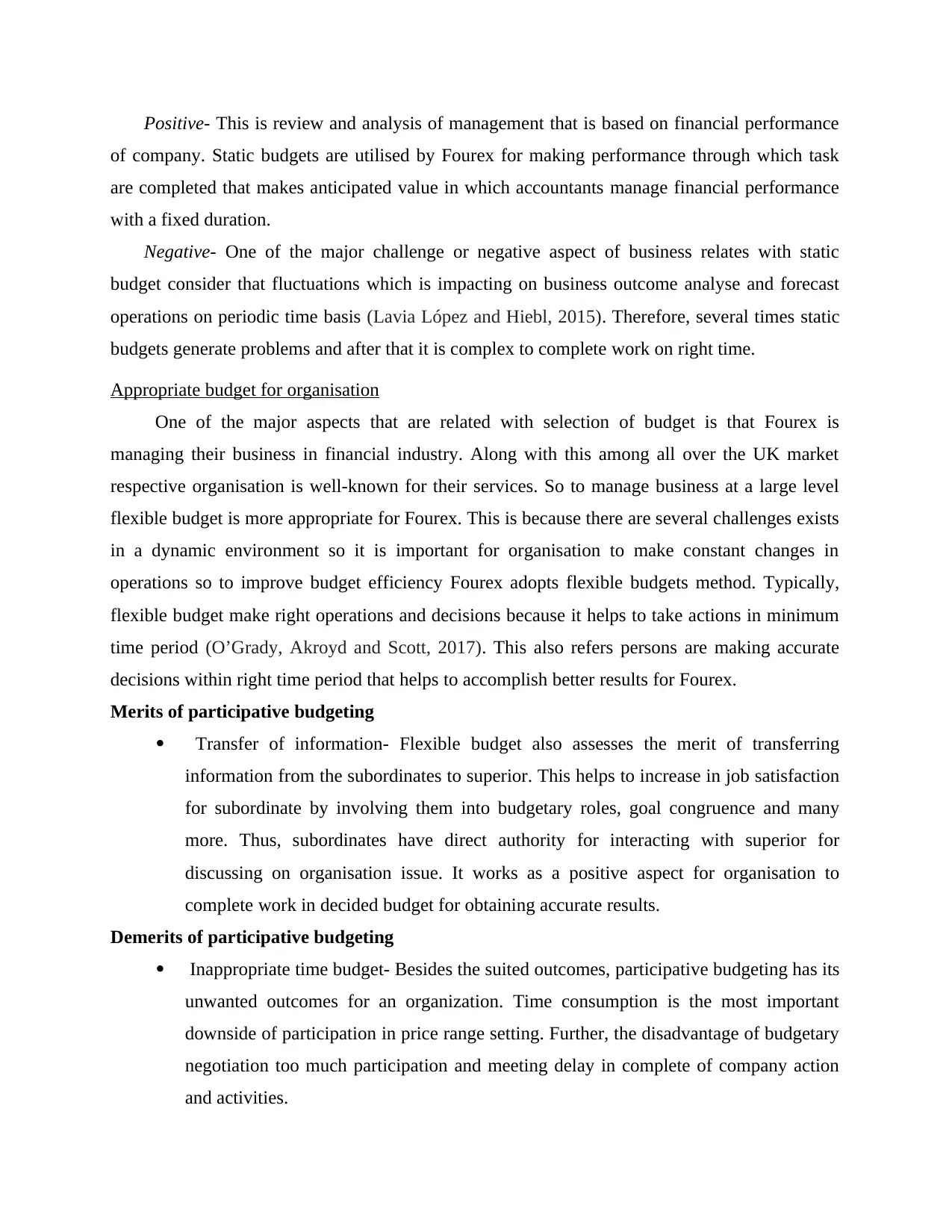
Positive- This is review and analysis of management that is based on financial performance
of company. Static budgets are utilised by Fourex for making performance through which task
are completed that makes anticipated value in which accountants manage financial performance
with a fixed duration.
Negative- One of the major challenge or negative aspect of business relates with static
budget consider that fluctuations which is impacting on business outcome analyse and forecast
operations on periodic time basis (Lavia López and Hiebl, 2015). Therefore, several times static
budgets generate problems and after that it is complex to complete work on right time.
Appropriate budget for organisation
One of the major aspects that are related with selection of budget is that Fourex is
managing their business in financial industry. Along with this among all over the UK market
respective organisation is well-known for their services. So to manage business at a large level
flexible budget is more appropriate for Fourex. This is because there are several challenges exists
in a dynamic environment so it is important for organisation to make constant changes in
operations so to improve budget efficiency Fourex adopts flexible budgets method. Typically,
flexible budget make right operations and decisions because it helps to take actions in minimum
time period (O’Grady, Akroyd and Scott, 2017). This also refers persons are making accurate
decisions within right time period that helps to accomplish better results for Fourex.
Merits of participative budgeting
Transfer of information- Flexible budget also assesses the merit of transferring
information from the subordinates to superior. This helps to increase in job satisfaction
for subordinate by involving them into budgetary roles, goal congruence and many
more. Thus, subordinates have direct authority for interacting with superior for
discussing on organisation issue. It works as a positive aspect for organisation to
complete work in decided budget for obtaining accurate results.
Demerits of participative budgeting
Inappropriate time budget- Besides the suited outcomes, participative budgeting has its
unwanted outcomes for an organization. Time consumption is the most important
downside of participation in price range setting. Further, the disadvantage of budgetary
negotiation too much participation and meeting delay in complete of company action
and activities.
of company. Static budgets are utilised by Fourex for making performance through which task
are completed that makes anticipated value in which accountants manage financial performance
with a fixed duration.
Negative- One of the major challenge or negative aspect of business relates with static
budget consider that fluctuations which is impacting on business outcome analyse and forecast
operations on periodic time basis (Lavia López and Hiebl, 2015). Therefore, several times static
budgets generate problems and after that it is complex to complete work on right time.
Appropriate budget for organisation
One of the major aspects that are related with selection of budget is that Fourex is
managing their business in financial industry. Along with this among all over the UK market
respective organisation is well-known for their services. So to manage business at a large level
flexible budget is more appropriate for Fourex. This is because there are several challenges exists
in a dynamic environment so it is important for organisation to make constant changes in
operations so to improve budget efficiency Fourex adopts flexible budgets method. Typically,
flexible budget make right operations and decisions because it helps to take actions in minimum
time period (O’Grady, Akroyd and Scott, 2017). This also refers persons are making accurate
decisions within right time period that helps to accomplish better results for Fourex.
Merits of participative budgeting
Transfer of information- Flexible budget also assesses the merit of transferring
information from the subordinates to superior. This helps to increase in job satisfaction
for subordinate by involving them into budgetary roles, goal congruence and many
more. Thus, subordinates have direct authority for interacting with superior for
discussing on organisation issue. It works as a positive aspect for organisation to
complete work in decided budget for obtaining accurate results.
Demerits of participative budgeting
Inappropriate time budget- Besides the suited outcomes, participative budgeting has its
unwanted outcomes for an organization. Time consumption is the most important
downside of participation in price range setting. Further, the disadvantage of budgetary
negotiation too much participation and meeting delay in complete of company action
and activities.
⊘ This is a preview!⊘
Do you want full access?
Subscribe today to unlock all pages.

Trusted by 1+ million students worldwide
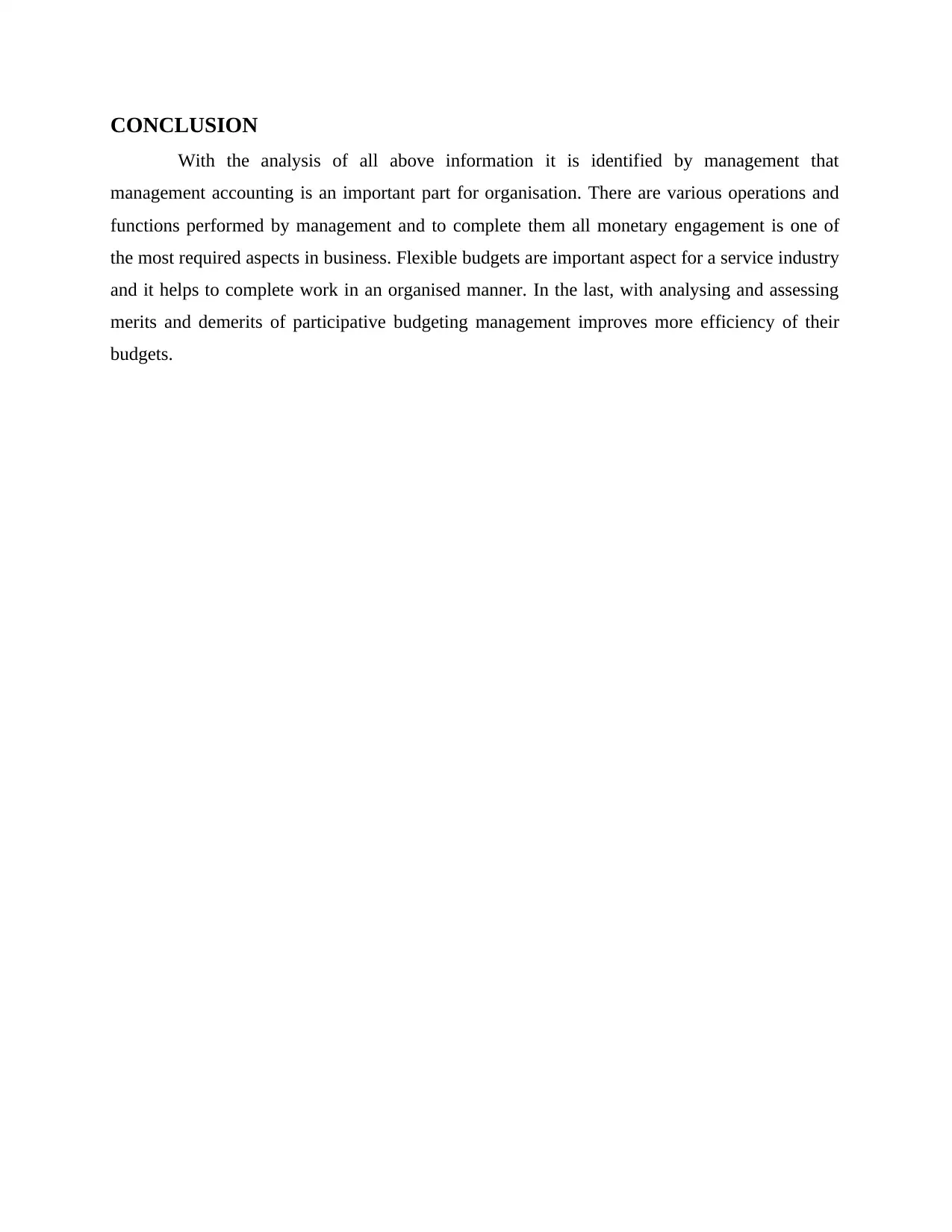
CONCLUSION
With the analysis of all above information it is identified by management that
management accounting is an important part for organisation. There are various operations and
functions performed by management and to complete them all monetary engagement is one of
the most required aspects in business. Flexible budgets are important aspect for a service industry
and it helps to complete work in an organised manner. In the last, with analysing and assessing
merits and demerits of participative budgeting management improves more efficiency of their
budgets.
With the analysis of all above information it is identified by management that
management accounting is an important part for organisation. There are various operations and
functions performed by management and to complete them all monetary engagement is one of
the most required aspects in business. Flexible budgets are important aspect for a service industry
and it helps to complete work in an organised manner. In the last, with analysing and assessing
merits and demerits of participative budgeting management improves more efficiency of their
budgets.
Paraphrase This Document
Need a fresh take? Get an instant paraphrase of this document with our AI Paraphraser
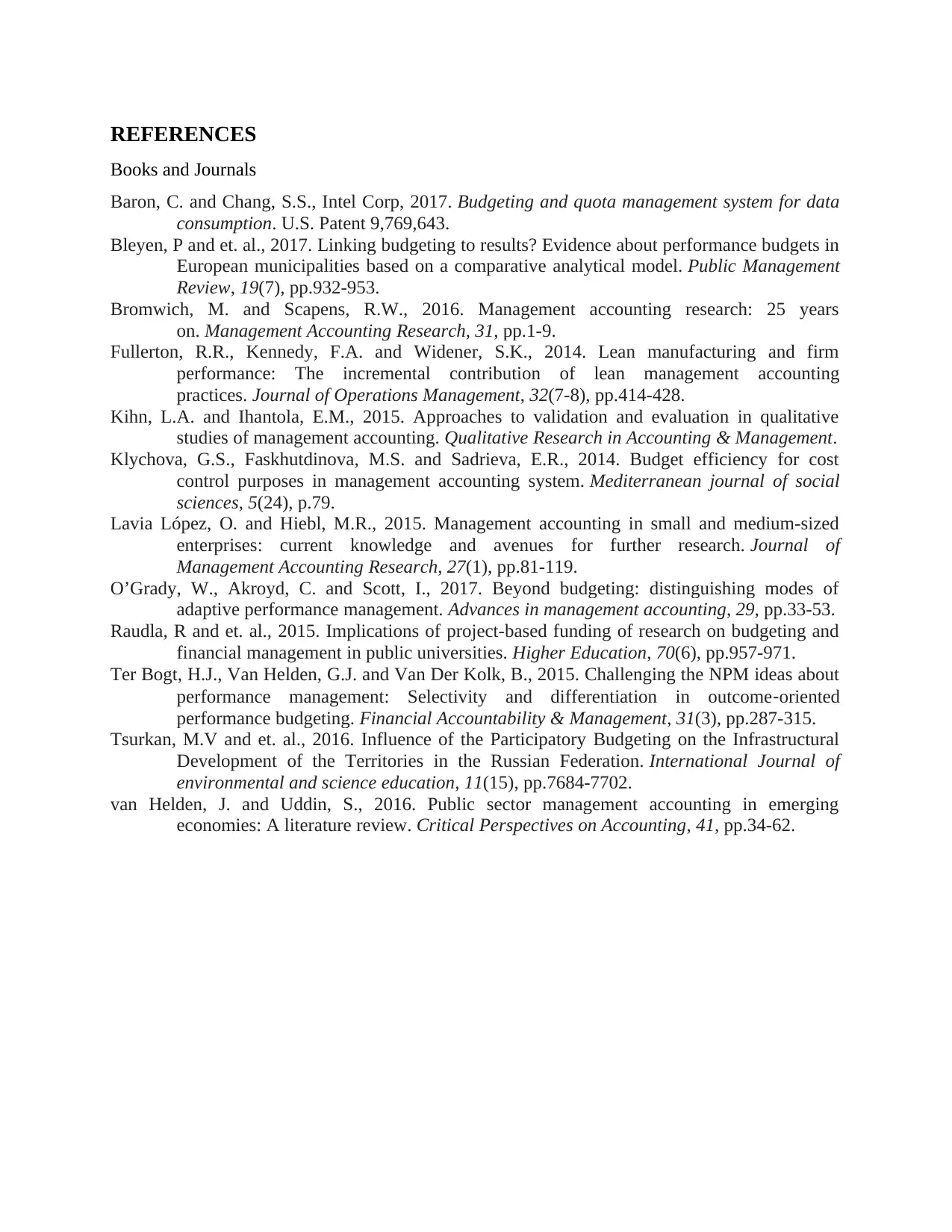
REFERENCES
Books and Journals
Baron, C. and Chang, S.S., Intel Corp, 2017. Budgeting and quota management system for data
consumption. U.S. Patent 9,769,643.
Bleyen, P and et. al., 2017. Linking budgeting to results? Evidence about performance budgets in
European municipalities based on a comparative analytical model. Public Management
Review, 19(7), pp.932-953.
Bromwich, M. and Scapens, R.W., 2016. Management accounting research: 25 years
on. Management Accounting Research, 31, pp.1-9.
Fullerton, R.R., Kennedy, F.A. and Widener, S.K., 2014. Lean manufacturing and firm
performance: The incremental contribution of lean management accounting
practices. Journal of Operations Management, 32(7-8), pp.414-428.
Kihn, L.A. and Ihantola, E.M., 2015. Approaches to validation and evaluation in qualitative
studies of management accounting. Qualitative Research in Accounting & Management.
Klychova, G.S., Faskhutdinova, М.S. and Sadrieva, E.R., 2014. Budget efficiency for cost
control purposes in management accounting system. Mediterranean journal of social
sciences, 5(24), p.79.
Lavia López, O. and Hiebl, M.R., 2015. Management accounting in small and medium-sized
enterprises: current knowledge and avenues for further research. Journal of
Management Accounting Research, 27(1), pp.81-119.
O’Grady, W., Akroyd, C. and Scott, I., 2017. Beyond budgeting: distinguishing modes of
adaptive performance management. Advances in management accounting, 29, pp.33-53.
Raudla, R and et. al., 2015. Implications of project-based funding of research on budgeting and
financial management in public universities. Higher Education, 70(6), pp.957-971.
Ter Bogt, H.J., Van Helden, G.J. and Van Der Kolk, B., 2015. Challenging the NPM ideas about
performance management: Selectivity and differentiation in outcome‐oriented
performance budgeting. Financial Accountability & Management, 31(3), pp.287-315.
Tsurkan, M.V and et. al., 2016. Influence of the Participatory Budgeting on the Infrastructural
Development of the Territories in the Russian Federation. International Journal of
environmental and science education, 11(15), pp.7684-7702.
van Helden, J. and Uddin, S., 2016. Public sector management accounting in emerging
economies: A literature review. Critical Perspectives on Accounting, 41, pp.34-62.
Books and Journals
Baron, C. and Chang, S.S., Intel Corp, 2017. Budgeting and quota management system for data
consumption. U.S. Patent 9,769,643.
Bleyen, P and et. al., 2017. Linking budgeting to results? Evidence about performance budgets in
European municipalities based on a comparative analytical model. Public Management
Review, 19(7), pp.932-953.
Bromwich, M. and Scapens, R.W., 2016. Management accounting research: 25 years
on. Management Accounting Research, 31, pp.1-9.
Fullerton, R.R., Kennedy, F.A. and Widener, S.K., 2014. Lean manufacturing and firm
performance: The incremental contribution of lean management accounting
practices. Journal of Operations Management, 32(7-8), pp.414-428.
Kihn, L.A. and Ihantola, E.M., 2015. Approaches to validation and evaluation in qualitative
studies of management accounting. Qualitative Research in Accounting & Management.
Klychova, G.S., Faskhutdinova, М.S. and Sadrieva, E.R., 2014. Budget efficiency for cost
control purposes in management accounting system. Mediterranean journal of social
sciences, 5(24), p.79.
Lavia López, O. and Hiebl, M.R., 2015. Management accounting in small and medium-sized
enterprises: current knowledge and avenues for further research. Journal of
Management Accounting Research, 27(1), pp.81-119.
O’Grady, W., Akroyd, C. and Scott, I., 2017. Beyond budgeting: distinguishing modes of
adaptive performance management. Advances in management accounting, 29, pp.33-53.
Raudla, R and et. al., 2015. Implications of project-based funding of research on budgeting and
financial management in public universities. Higher Education, 70(6), pp.957-971.
Ter Bogt, H.J., Van Helden, G.J. and Van Der Kolk, B., 2015. Challenging the NPM ideas about
performance management: Selectivity and differentiation in outcome‐oriented
performance budgeting. Financial Accountability & Management, 31(3), pp.287-315.
Tsurkan, M.V and et. al., 2016. Influence of the Participatory Budgeting on the Infrastructural
Development of the Territories in the Russian Federation. International Journal of
environmental and science education, 11(15), pp.7684-7702.
van Helden, J. and Uddin, S., 2016. Public sector management accounting in emerging
economies: A literature review. Critical Perspectives on Accounting, 41, pp.34-62.

⊘ This is a preview!⊘
Do you want full access?
Subscribe today to unlock all pages.

Trusted by 1+ million students worldwide
1 out of 9
Related Documents
Your All-in-One AI-Powered Toolkit for Academic Success.
+13062052269
info@desklib.com
Available 24*7 on WhatsApp / Email
![[object Object]](/_next/static/media/star-bottom.7253800d.svg)
Unlock your academic potential
Copyright © 2020–2025 A2Z Services. All Rights Reserved. Developed and managed by ZUCOL.




